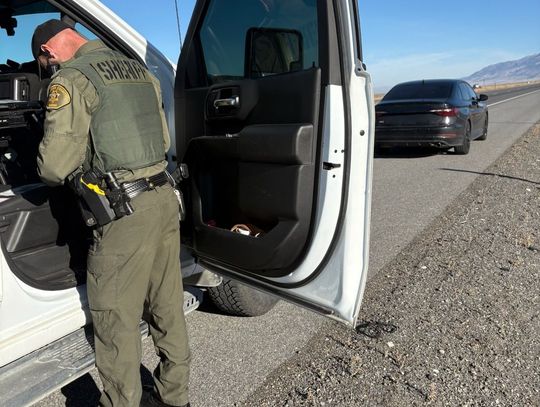Eighty days out from the annual Burning Man event in the Black Rock Desert, representatives from the Burning Man Project appeared before the Pershing County Commission with a familiar pitch: a reaffirmation of their partnership with local agencies, a rundown of financial contributions, and a plea to renegotiate direct funding to the county.
But the reception was frostier than in years past.
Katie Hoffman, agency relations manager for the nonprofit behind Burning Man, and Greg Herrera, law enforcement liaison, outlined a series of community benefits provided by the event, ranging from fuel, meals, and on-site logistics for law enforcement, to nearly $150,000 in local donations over the past decade.
“Since 2014, we’ve paid over $2.25 million to Pershing County for our events,” Hoffman said. “When we had a direct contract, the county received not just reimbursement for law enforcement, but funds that could be used for public projects, programming, and community priorities.”
In 2023, the county received $190,000 above law enforcement costs under the now-expired agreement. But in 2024, the arrangement changed: Burning Man now pays the Bureau of Land Management (BLM), which in turn contracts with the Pershing County Sheriff’s Office. That federal contract included a 20% administration fee, approximately $52,000, that once went directly to the county but is now retained by the federal government.
Herrera emphasized that the shift has created a barrier. “We’d rather see that money go back to the county, not Washington,” he said. “There are fewer resources now for the very people who help make this event safe and successful.”
Despite the polished presentation and acknowledgment of local law enforcement’s professionalism, the commissioners were not quick to sympathize.
“You’re claiming to be a benefactor to Pershing County, but we’re not subsidizing you,” Commissioner Chuck Sayles said. “It feels like we’re being treated as a charity case, when in reality, we’re hosting a massive event that takes a year-round toll on our people and resources.”
He questioned why other large-scale events across other counties in Nevada, including Clark, remit a portion of ticket sales directly to host jurisdictions, while Pershing County is instead left to negotiate for residuals.
“There should be a fee structure, a per-ticket cut, just like any other county would require,” Sayles said. “You’re selling tens of thousands of tickets. We shouldn’t have to ask nicely for a share; we should have event fees.”
Burning Man’s attendance has declined in recent years, dropping to 69,000 in 2024—down from 75,000 in 2022, and below the 80,000-participant cap. The decrease has created financial strain for the organization, which described “multimillion dollar budget shortfalls” and cuts to internal operations.
Still, the county’s frustration didn’t center on Burning Man’s financial woes. It centered on what commissioners viewed as a misalignment of benefit and burden.
“Let’s be clear,” Commissioner Connie Gottschalk said. “This is not a 10-day event for us. It’s a year-round logistical operation, and there’s no clear recognition of that in your current arrangement.”
The tension escalated during a discussion of past donations. Burning Man attempted to make contributions to local nonprofits after the 2023 event but was directed not to do so, they claimed, due to policy concerns raised by the county.
“We were disappointed to be told not to donate,” Hoffman said. “We’ve supported the library, the senior center, the food bank, these are groups that matter.”
In response, commissioners raised concerns about whether such donations created inappropriate influence or masked imbalances in how public costs are absorbed.
The presentation closed with another offer from Burning Man: to meet with the sheriff, district attorney, and commissioners to work toward a new contract that might return funding directly to the county.
For now, no formal negotiations have been scheduled.











Comment
Comments